Updated June 28, 2023
The simple mixture of sand, gravel, cement, and water has become a cornerstone in construction, whether in residential or commercial buildings. With 4.4 billion tons of concrete produced in 2020, projections place the number exceeding 5 billion tons by 2050. However, every contractor's obvious challenge is knowing how much concrete a job needs.
Using a concrete calculator spares you from wasting material during construction or having too little material to complete the job. This simple tool considers the cubic feet of the area, allowing you to estimate how many bags of cement and other materials you need. Hence, it is essential in any concrete project, whether smaller jobs like a patio or a pedestrian walkway.
A few punches into the concrete calculator will reveal figures that will help you estimate the amount of concrete you need. Yet, things don’t end with knowing how much concrete the area will consume. We will explore the concrete calculator formula and other essentials to ensure you get every square inch correct.
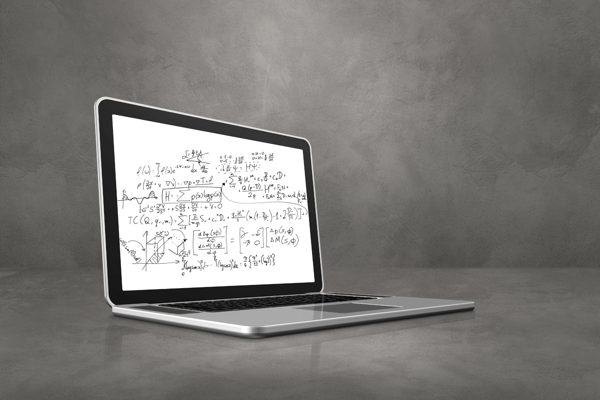
Using the Concrete Calculator Formula
Large and small projects have three significant constraints: scope, time, and cost. Knowing how much concrete you need saves money, whether you are doing a resurfacing project or installing new floors. That is something you can only afford to get right.
So, calculating the concrete volume that will occupy that area is a necessity you cannot avoid. Some calculators will give you both volume and how many pre mix bags of concrete you need.
These are the parameters and things you can calculate:
- Concrete slabs
- Concrete walls
- Concrete footing
- Hole, round footings, and concrete column
- Round column
- Stairs
- Circular or round slab
- A barrier for curb and gutter
Calculating the number of bags of concrete for these sections begins with the total volume. Then, you can add flag thickness, length, and quantity, depending on which section your project is in. These are the basics of those flooring ideas you might have in mind.
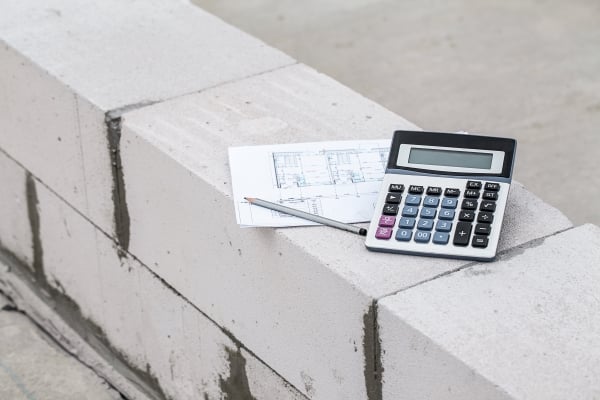
The Formula
You’ll find several online calculators that just need a few parameters to give you answers. However, it is best to know the logic behind them and how they work.
Let’s begin with the pre-mix bags and work our way down. Ready mix companies produce and sell them in different sizes and weights. So, we have 90lb, 80lb, 60lb, 50lb, and 40lb.
The concrete calculator formula for the number of bags you need for a project is as follows:
The number of bags = total cubic yards of concrete/bags yields in yards
The number of bags for one cubic yard = one cubic yard/bags yields
Everything begins with the concrete volume. Calculate that parameter wrongly, and you’ll need extra concrete for your project or have excess.

Calculating the Concrete Volume
The next step is estimating the concrete volume. You can use the cubic yard or cubic meter, depending on your region.
We will assume these yields for each bag size
- 40lb = 0.011 cubic yards of concrete
- 50lb = 0.0138 cubic yards
- 60lb = 0.017 cubic yards
- 80lb = 0.022 cubic yards
- 90lb = 0.025 cubic yards
These figures will be the basis of our calculation. Let’s move on to each section as mentioned in the previous heading:
Concrete Slab Calculator
A concrete slab can either be rectangular, square, or round. The rectangular and square types have a different concrete calculator formula from the round slab. Nevertheless, you must get the concrete volume before calculating the number of bags.
For a square footage slab, the formula is as follows:
Volume = length * width * thickness
Bags of concrete needed = volume (cubic yards)/bags yield
For a round slab, the volume of the hollow concrete slab will differ from the solid one. You’ll consider the inside and outside diameters of the hollow slabs. Once you obtain the volume, you can get the bags needed for the project.
The above formula is not only applicable to a square or round slab. It applies to square and round footings, round columns, and a concrete wall.
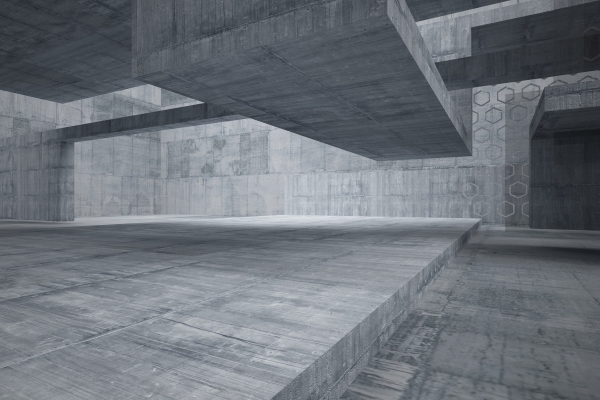
Barriers for Curb and Gutter
Slabs are easier to calculate. Similarly, getting a gutter volume is easy. Use the formula to calculate curbs and gutters:
Curb volume = curb height * curb depth * length
Gutter volume = gutter width * flag thickness * length
Then, add them together to get the total before calculating the bags of concrete needed.
Concrete needed = total volume (cubic yards)/bags yields
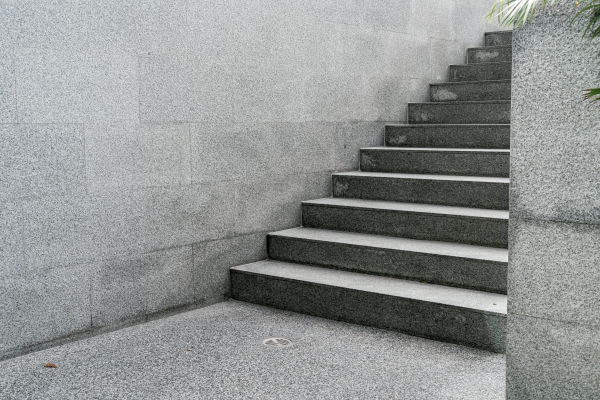
Stairs
If your next project involves stairs, here’s what you need before ordering concrete bags:
Measure the following parameters:
- Run
- Rise height
- Step width
- Platform depth
- Number of steps
You can calculate the volume of each section using rise height, step width, and run before adding them to get the total concrete volume. Conversely, an online calculator will take those variables and give you the quantity of cement or concrete you need.

Factors to Consider When Preparing for Concrete Projects
Figuring out the quantity is essential to managing the supply chain for your project. You’ll know when to get extra without impacting the cost. However, quantity and material are not the same thing.
Besides the material type, you must also consider the machines you need, from mixers to simple grinders. The aim is to avoid a bad concrete job.
So, what should you consider to ensure quantity, cost, and material align? They include the following:
Concrete Type
Small curbs may require a different material than a footing. The final strength for both sections differs. Hence, you must calculate concrete from a strength perspective.
The strength you need determines the materials, which invariably affects the yield. For example, quick-set concrete may have different yields than other types.
The typical types of cement for projects include the following:
- Quick setting
- Regular setting
- High strength
- Crack resistance
These materials have different setting times. Their placement depends on the strength you need. For example, the slab placed on a driveway for vehicular traffic will be stronger than the one with little to no load.
Concrete might have an average strength of 3,000 psi but can increase to 20,000 psi. You can progress to other considerations once these are out of the way.
Bagged or Ready Mix Concrete
We used the bagged type for our calculations on this page. Calculate the total cubic yards and contact a ready mix company if you want to skip that process. It will deliver the concrete order to your site via transit mixers.
The bagged types are ideal for small projects. You can use them for a simple square-foot slab in your home or area.
Conversely, ready mix types are durable, and you can tailor them to different requirements. Let’s see their pros and cons.
Pros of Bagged Type
- Ideal for smaller jobs
- Less expensive
- Easy to mix
- Purchasable in home supply stores
Cons of Bagged Type
- Requires a mixer on site
- Less tensile strength
- Lower ductility
Pros of Ready Mix Concrete
- The material is ready to pour
- Tailor the mix to your requirement.
- Ideal for more extensive projects (e.g., as a foundational slab for a commercial building)
- Calculate the cubic yard only
Cons of Ready Mix Type
- Expensive to obtain compared to the bagged types
- Suppliers have a minimum cubic yardage they supply
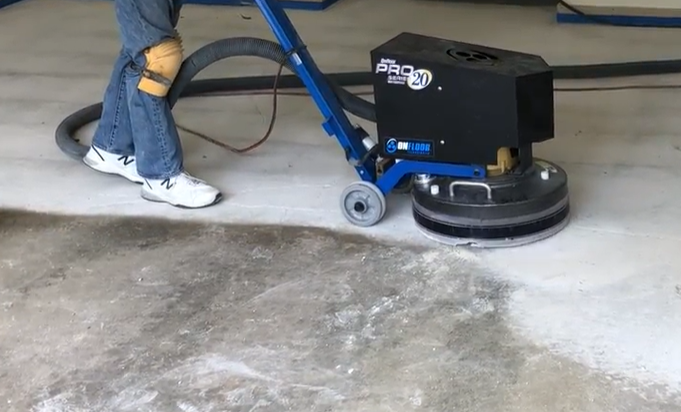
Tools for Your Project
The tools you need depend on the job. Simple trowels and brushes will be adequate for a slab with a few cubic meters. The wider the area and the deeper the depth, the more equipment you need.
Then, you’ll need grinding machines to deal with finishing. The tools do not affect the quantity of materials you need.
The Concrete Sealer
You might want to use a sealer after completing your flooring job. The ideal waiting period before application is 30 days. However, calculating how much sealer you need differs from what we discussed above.
A sealer preserves the finish of the floor and also does the following:
- Protects against weather
- Prevents stains
- Protects against abrasions
Apply the sealer carefully.
Counting the Cost
Determining the quantity already tells you the cost of your job. You can easily take the prize per bag or cubic yardage to know how much is needed.
There is no calculator you can use for this process. Pick out the quantity you need and contact suppliers for the unit price. Then, you can get the total amount required, including discounts for purchasing in bulk.
Conclusion
A simple online concrete calculator can help you know how much you need for a job. The basics involve calculating the volume in cubic yards or cubic meters and dividing that by the bag yield.
Bag types come in different sizes and weights. They have different yields. Hence, some calculators will calculate how many you need for each weight.
Conversely, ready mix types come in cubic yards or meters; you only need the volume to get the quantity. Variables for calculating volume include length, width, depth, etc. More might be added, depending on the cross-section.
Some regions use cubic yards, while others use cubic meters. Ensure your calculations use the same unit of measurement consistent with your area.

0 comments